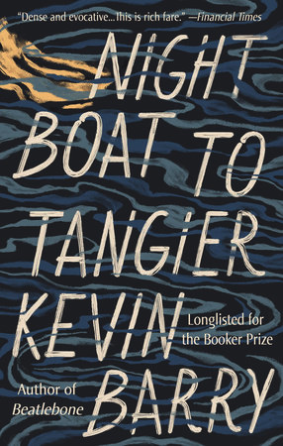Review | Kevin Barry’s Night Boat to Tangier
Novel is Hyper-Charged with Wit and Rhythmic Language

“It’s not right,” says Charlie Redmond, one of two main characters in Kevin Barry’s magnificently entertaining novel Night Boat to Tangier. His best friend and sometime rival Maurice Hearne responds, “It’s an end to a whole way of being.” Charlie confirms that notion: “The likes of you and me won’t pass this way again.” Not surprisingly, considering Barry’s wicked sense of humor, the “way of being” these two rapidly aging Irishmen are discussing is not fishing or farming but drug smuggling.
The main action of the novel is set in the Spanish port city of Algeciras on an October evening in 2018, and Charlie and Maurice are there in the hope of seeing Maurice’s daughter Dilly, who has gone to ground among young people who “carry heavy rucksacks,” whose “hair is worn in dreadlocks,” and whose “clothes are ragged, their skins nut-brown.” Interspersed between the Algeciras chapters, where “rain falls as if to wash our meagre sins away,” are extended flashbacks showing the life — sometimes exciting, often violent, and invariably confused — that has led Charlie and Maurice to where they are.
There is more than a little Samuel Beckett in the dialogue of the two has-been gangsters, and anticipating Dilly’s arrival on the ferry from Tangier is not unlike waiting for Godot. Like Beckett’s great play, Night Boat to Tangier is depressing, but it’s so hyper-charged with wit and rhythmic language that most readers will not want Charlie and Maurice’s waiting it to end.
At the Santa Barbara Independent, our staff continues to cover every aspect of the COVID-19 pandemic. Support the important work we do by making a



